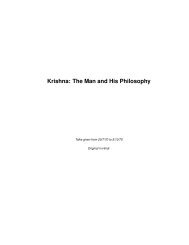Come Follow To You, Vol 1 - Oshorajneesh.com
Come Follow To You, Vol 1 - Oshorajneesh.com
Come Follow To You, Vol 1 - Oshorajneesh.com
Create successful ePaper yourself
Turn your PDF publications into a flip-book with our unique Google optimized e-Paper software.
That is not the point. Whether they hear it or not is not the point: I should go oncalling. They may be deaf, but I am not dumb. If they don't listen I will have tocall more loudly, that's all.And when you call a thousand, only a hundred will listen. One can never knowwho the hundred will be. <strong>You</strong> call a thousand -- a hundred will listen. The verynature of the call is such that only those who are just near awakening can listento it. Only those whose sleep is almost <strong>com</strong>plete, who are nearing the morningand are getting ready to wake -- only they can listen. But you cannot see whothose will be.Call a thousand: a hundred will listen and only ten will start moving. Ninety willlisten and still will not move. They will listen but they will not understand orthey will understand something else -- or they will misunderstand. Ten will startmoving. And when ten move, only one reaches; nine will be lost on the way. Calla thousand and you have called only one. But this is how things are, so one hasto go on calling.So I don't bother a bit whether you listen or not -- I go on calling. One is bound to<strong>com</strong>e and that's enough. If you call a thousand and one <strong>com</strong>es, if you call tenthousand and ten <strong>com</strong>e, that's enough. One should not ask for more; that isalready too much.<strong>You</strong> are right that only those who have suffered will be able to understand me.Pain purifies, suffering gives understanding. Suffering gives a certaincrystallization: unless you suffer you don't know what life is, unless you sufferyou don't know how difficult it is to get out of life.I was reading the life of a great Japanese poet, Issa. He suffered. He must havebeen a very, very sensitive man: he was a great poet, he's one of the greatesthaiku poets.When he was only thirty he had already lost his five children; five children haddied by the time he was thirty -- almost every year a child died. Then his wifedied and he was almost <strong>com</strong>pletely mad -- in anguish, in suffering.I{e went to a Zen Master. The Zen Master asked, "What is the problem?" The ZenMaster must have been almost like a Buddha, not like Jesus. One who hasattained but one who has <strong>com</strong>pletely forgotten human misery.Issa said, "My five children are dead and now my wife is dead. Why is there somuch suffering? I can't see the reason for it. What is the explanation? I have notdone anything wrong to anybody, I have lived as innocently as possible. In fact Ihave lived very much aloof. I'm not very related to people -- I'm a poet, I live inmy own world. I have not done anything wrong to anybody."I have lived a very poor life, but I was happy. Now suddenly my five childrenare gone, my wife is also gone -- why is there so much suffering, and for noreason? I here must be an explanation."The Zen Master said, "Life is just like a dew-drop in the morning. It is the natureof life that death happens. I here is no explanation; it is the nature of life. There isno need for any special reason to be given. Life's nature is like a dew-drop: it<strong>Come</strong> <strong>Follow</strong> <strong>To</strong> <strong>You</strong> <strong>Vol</strong> 1Osho
















